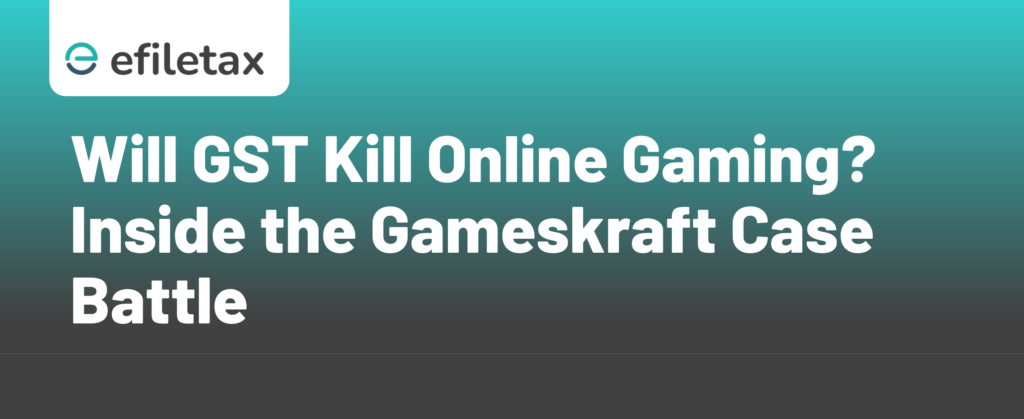
Gameskraft GST Case What’s at Stake?
The Gameskraft GST case has become a defining moment for India’s online gaming sector. The ₹21,000 crore tax demand hinges on whether playing online games like rummy involves a transfer of actionable claims — a concept borrowed from contract law.
On Day 8 of the Supreme Court hearing, Senior Counsel argued:
“Playing on online platforms or in casinos is not a transfer of actionable claims.”
This statement challenges the very basis of the tax demand issued by the Directorate General of GST Intelligence (DGGI). Let’s break it down.
What Is an Actionable Claim Under GST?
Under Section 2(1) of the CGST Act, “actionable claims” include unsecured debts or beneficial interest in movable property not in possession. Importantly:
- Actionable claims are excluded from GST (Schedule III).
- But the government treats lottery, betting, and gambling as exceptions — they’re taxable at 28%.
Online Gaming vs Gambling: Why It Matters
| Criteria | Online Rummy (Gameskraft) | Casino Gambling |
|---|---|---|
| Skill involved | Yes | Mostly chance-based |
| Stakes refundable? | Yes (sometimes) | No |
| Legal in many Indian states? | Yes | Mostly banned |
| Treated as “gambling”? | No (argued by Gameskraft) | Yes |
| Tax rate proposed | 18% or NIL (skill-based) | 28% |
The key argument: Skill-based games ≠ Gambling ≠ Actionable claims
Legal Timeline: How the Case Reached the Supreme Court
- 2022: GST authorities demand ₹21,000 Cr from Gameskraft
- 2023: Karnataka High Court quashes the GST notice
- 2023–24: Union of India appeals to the Supreme Court
- May 2025: Hearings continue; the outcome will set national precedent
What Senior Counsel Argued (Day 8 Highlights)
- Playing a game is not a legal transfer of claim.
- Wagering contracts are different from games of skill.
- GST law should differentiate online gaming from gambling.
This strengthens the industry’s stand that platform fees (like rake) should not be taxed like casino revenues.
Why It Matters for Indian Taxpayers
- For Players: You may be paying GST on winnings that may not be legally taxable.
- For Platforms: GST liability could swing drastically depending on this ruling.
- For Government: Clarity could define future tax policy on digital economy.
CBIC’s View vs Industry Perspective
CBIC argues:
Online games with money stakes = gambling = actionable claims → taxable at 28%
Industry counters:
Games of skill don’t fall under Schedule III exceptions
Hence, they’re not actionable claims and shouldn’t be taxed as gambling
Expert View: CA Mehta on Actionable Claims
“Labeling online rummy as gambling could misapply GST laws. Taxability should consider skill, not just monetary stakes.”
What Happens If Gameskraft Wins?
- ₹21,000 Cr demand may be nullified
- Massive relief to the online gaming sector
- Future of GST on skill gaming may move toward 18% or NIL rate
What If Gameskraft Loses?
- Precedent set for 28% GST on all real-money games
- Retrospective tax demands across platforms
- Possible shift in business models or exits from India
Summary
Gameskraft’s GST case questions if online games like rummy are actionable claims under Indian GST law. Senior counsel says no transfer occurs. SC verdict will impact ₹21,000 Cr tax demand.
FAQs
Q1. What is the current GST rate on online games?
As per CBIC, 28% GST applies on total entry amount for real-money games involving betting/gambling. The final decision is pending before the SC.
Q2. Why is Gameskraft’s case important?
Because it will determine the taxability of all skill-based online games under GST — impacting investors, platforms, and users.
Q3. Can this ruling apply retrospectively?
Yes. If the court sides with the government, tax demands from previous years may be upheld.
Closing Note:
Stay updated with Efiletax for in-depth legal coverage on GST, gaming tax issues, and Supreme Court verdicts. Need help with GST litigation or tax compliance?